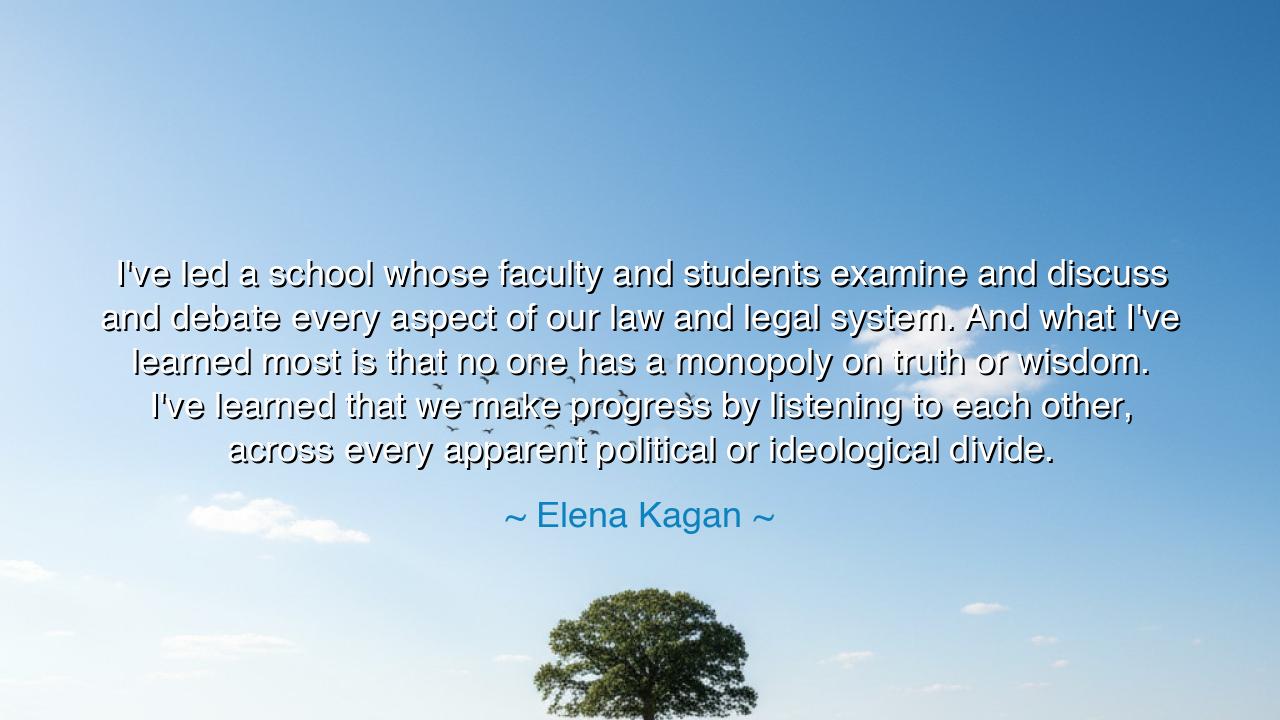
I've led a school whose faculty and students examine and discuss
I've led a school whose faculty and students examine and discuss and debate every aspect of our law and legal system. And what I've learned most is that no one has a monopoly on truth or wisdom. I've learned that we make progress by listening to each other, across every apparent political or ideological divide.






Hear the words of Elena Kagan, spoken with the calm strength of one who has walked among the halls of learning and the chambers of power: “I've led a school whose faculty and students examine and discuss and debate every aspect of our law and legal system. And what I've learned most is that no one has a monopoly on truth or wisdom. I've learned that we make progress by listening to each other, across every apparent political or ideological divide.” In these words lies both humility and courage—the humility to admit that wisdom is never complete in one person, and the courage to seek it in the voices of others.
At the heart of her saying is the recognition that truth and wisdom cannot be hoarded. They are not the treasures of one ideology, nor the possession of one class of people. They are scattered across humanity, like stars across the night sky. To imagine that one group, one party, one philosophy holds them entirely is to fall into arrogance and blindness. Kagan’s wisdom reminds us that truth is revealed through dialogue, through the sharpening of ideas against each other, as iron sharpens iron.
Her words are rooted in her own experience as Dean of Harvard Law School, where she presided over a community of scholars and students of every persuasion. Within those halls, debates raged over the Constitution, over justice, over the boundaries of freedom and power. Yet in the clash of argument, she did not find division only—she found growth. It was there she discovered that the greatest progress is born not of silencing dissent, but of welcoming it, of listening across divides that at first appear insurmountable.
History provides shining examples of this truth. In the Constitutional Convention of 1787, men of vastly different views gathered—some favoring strong central power, others fiercely defending the rights of states. Through days of heated debate, they forged compromises that created the American Constitution, a document enduring for centuries. Had one faction claimed monopoly on truth, the effort would have collapsed. Instead, progress came by listening, by yielding where wisdom demanded, and by standing firm where principle required. Thus, Kagan’s insight is confirmed: dialogue across divides is the mother of lasting progress.
The wisdom here is also deeply human. In families, in communities, in nations, conflict is inevitable. Yet when we assume the other side has nothing to teach us, we harden into enemies. But when we listen, we may find fragments of truth even in the voices we least expect. To listen across ideological divides is not weakness, but strength, for it requires humility, patience, and faith that truth is larger than any one viewpoint.
Consider also the story of Abraham Lincoln, who filled his cabinet not with allies alone but with rivals—men who often disagreed with him. Yet he welcomed their voices, knowing that in dissent lay protection against error. This “team of rivals” helped him guide the nation through its greatest trial. His wisdom was not in believing he knew all, but in knowing he needed the counsel of others. Kagan’s words echo this same spirit: progress requires ears open to many voices.
The lesson for us is urgent and timeless: seek dialogue, not domination. In our age, where politics divides neighbors and ideology hardens hearts, Kagan’s wisdom is a lantern. If we wish to advance—as communities, as nations, as humanity—we must abandon the arrogance of monopoly on truth. We must practice listening not as formality but as discipline, and learn to value even those we disagree with as partners in the pursuit of wisdom.
Therefore, children of tomorrow, let these words be etched in your hearts: no one owns truth; no one owns wisdom. They are discovered together, in the crucible of debate, in the openness of dialogue, in the humility of listening. Do not fear the clash of ideas—welcome it, for it is the forge where progress is made. And remember always: listening across divides is not a concession, but the path by which justice and truth may flourish.






AAdministratorAdministrator
Welcome, honored guests. Please leave a comment, we will respond soon